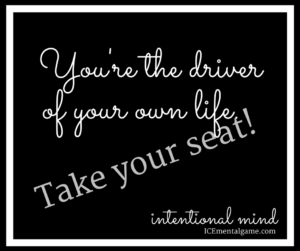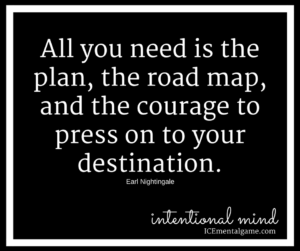When go out onto the ice to compete, once the gate closes, you are on your own. Your coach and the rest of your team (parents, support coaches, trainers, mental game coach) can help you prepare, but you are the only one that can make the magic happen.
The truth is, whatever your sport, the only person responsible for your success is you. Coaches appropriate to your level may come and go throughout your development, but you (and your parents) are in it for the long run.
 Look at your skating career as a journey. You and your team are on a bus traveling along the road to your destination (dream). The bus can not go anywhere without a driver. The bus will get to a destination quicker if the driver knows where to go.
Look at your skating career as a journey. You and your team are on a bus traveling along the road to your destination (dream). The bus can not go anywhere without a driver. The bus will get to a destination quicker if the driver knows where to go.
Who is driving your bus?
Do you take charge and drive your bus, communicate to your coaches and make the decisions that will take you closer to your ultimate goal or are you content to sit in the back and let someone else drive your bus, hoping that you will eventually reach your dream?
If you started skating very young, you might be used to riding your bus. Now that you are a little older, it’s time to start sharing the driver’s seat, ask questions, participate more in the decision making and learn more about what you need to do to reach the goal you set for yourself.
Eventually, you will be the one and only driver of your bus on this skating journey (as in life). The more aware, educated and involved in your training you are, the more you can be sure that what you are doing will take you to your ultimate goal.
For effective training leading to maximum improvement in the minimum amount of time, you need to:
-Know your goals, and follow your plan
-Take responsibility for your journey
Part 2
-Get educated
-Communicate with your support team
-Take action, do the work
Know your Goals and Follow Your Plan
Whether your goal is to compete internationally for your country, or successfully complete all of your tests, understanding the requirements for each accomplishment will save you time and decrease stress.
Many athletes in both individual and team sports rely solely on their coaches to tell them what to do, and when to do it. They show up to practice and wait to be told what to do. They do this for years without questioning whether what they are doing will take them where they want to be. Practice without knowing why you do it, year after year is easy, but it can slow you down if you have specific dreams.
Knowing the path to the your goal will help you to prepare to meet each challenge fully.
For example, doing off ice conditioning early in your career will strengthen the muscles needed to support more difficult jumps at the higher levels.
When you get to a certain level, your coach will suggest this, or not (some start the same time you start on the ice, some never recommend it). If you know about the benefits of off ice training, you will know enough to ask your coach about it, and can be sure to start building your a strong foundation through off ice training at the appropriate time.
As you go through your career, pay attention and learn from your coaches. As you progress to higher levels, gradually take on more responsibility. Communicate your goals and challenges with your coaches and listen to their expert opinions and advice. This will help you gather together the pieces that will fit into your plan for success.
Learn how to make effective goals: tutorial here.
Take Responsibility for your Journey
Skaters work privately with a primary coach 3-5 times a week. Because of this close relationship, it is easy to assume that the coach will keep track of everything that will help you get to your goals.
If you have an exceptional coach, this could be true. However, most coaches have many students at a variety of levels at the same time. Busy coaches need to balance all of their students’ needs as well as their many other responsibilities.
Of course, your coaches will spend time thinking about your development, but you are not and should not be their only priority. They must balance the needs of every one of their students in the time they have no matter what their level. In addition, coaches do not know everything about you and your goals, so they cannot be 100% responsible for making them happen.
A common example is the skater who gets their score after a clean skate only to find out that one of their spins doesn’t count because it was illegal. Rules change constantly and are so complex that sometimes coaches have to learn how to decipher them from Judges.
Of course a coach might be disappointed but will treat it as a learning experience and move on. You might be really upset and even lose trust in your coach when you come out 2 places below where you could have been.
Instead of pointing fingers and assigning blame, take steps ahead of time to be prepared to get the best score possible. Do your research and double check the rules on your own. 2 pairs of eyes are much better than one.
If you see something you don’t understand, ask your coach. You still might not be able to avoid a big mistake (that is why critiques were invented), but knowing that you have some control and understand the complexity of the rules, and being proactive takes the burden off of your relationship with your coach and you will be able to treat the as a learning experience instead of a failure and move one more quickly.
Get support when you need it. Working with an expert saves time, energy and money. If you need more strength in your back, get a conditioning specialist. If you need more flexibility, take Gyrotonic or Gyrokinesis. If you need to work on lines and artistry, take ballet or dance. If you “choke” under pressure, hire a mental game specialist.
The bottom line is that the only person responsible for your success is you. If you have the right coach, you will be able to ask questions and get referrals to specialists, or understand why a specialist isn’t needed right now. Trust your coach, but also make sure you take care of yourself.
Sometimes you might need to explore something that is different from what your coach thinks. Be respectful and do your research before you make a decision. Your coach is the expert, and if you communicate very clearly and they still say no, make sure you take this into consideration when choosing your path. Make your decision with respect, patience and honesty.
The sooner you understand that you are in charge of your success the better, because if you are in control of your training, you can be sure that you are doing exactly what you need to reach your ultimate goal.
Make Effective Goals: tutorial
Read part 2: How to Take Charge of Your Training
